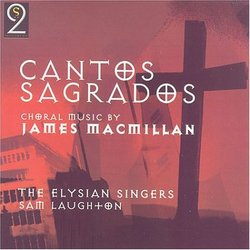| All Artists: James [2] MacMillan, Jennifer Dunford, Catherine Gill, Stephen Cviic, Charlotte Rusby, Katie Saunders, Anne Taylor Title: Cantos Sagrados: Choral Music by James Macmillan Members Wishing: 1 Total Copies: 0 Label: Signum UK Release Date: 6/29/2004 Album Type: Import Genre: Classical Style: Opera & Classical Vocal Number of Discs: 1 SwapaCD Credits: 1 UPCs: 675754737320, 635212050729, 669910060469 |
Search - James [2] MacMillan, Jennifer Dunford, Catherine Gill :: Cantos Sagrados: Choral Music by James Macmillan
 | James [2] MacMillan, Jennifer Dunford, Catherine Gill Cantos Sagrados: Choral Music by James Macmillan Genre: Classical
|
Larger Image |
CD Details |
CD ReviewsHair-raisingly intense R. Anthony Lee | Lafayette CO | 01/21/2006 (5 out of 5 stars) "From the opening, where the two choruses are almost literally yelling at each other in an exchange which we imagine is taking place amidst noise and turmoil approaching riot, to the final whispered plea for forgiveness, Cantos Sagrados (the major work from which the CD takes its name) is hair-raisingly, breathtakingly intense. In a performance I was part of, people in the audience were openly weeping, and the end was followed by a stunned silence of 7 or 8 seconds during which nobody quite knew what to do. MacMillan, like Britten in the War Requiem, juxtaposes ancient Latin texts from the Catholic liturgy ("Libera animas omnium fidelium," "Salve Mater, coeli porta," "Et incarnatus est") with contemporary texts (translated from Spanish) depicting examples of the horrifyingly brutal inhumanity of regimes of power. The first and third movements use poems of Ariel Dorfman referring to events of political repression in Latin America, and the middle one is a prayer by Ana Maria Mendoza to the Virgin of Guadalupe in which she asks why the Catholic priests burn the homes of the indigenous Indians with people still inside them. This latter one is sung by the women's voices while the lower voices intone below them, "Save us, Mother, Gate of Heaven," and in the third movement, one chorus describes the execution of a political prisoner by firing squad while the other one sings, "He was crucified for our sake." It is very strong medicine.
Since I bought the CD for the piece with which I was already familiar, I haven't formed much of an impression of the smaller works. Three of them are based on Latin texts, and most are commissioned or written for particular events and/or places. One, commissioned by King's College, Cambridge, for the 1995 Service of Lessons and Carols, uses a 13th-century macaronic text which is almost incomprehensible; most of us would like a translation of the Chaucer-like "Ho werchet me ful muchel wo, Bote yef he wole wende me fro." MacMillan shows his Scottish roots in setting two poems of Robert Burns, and some of the melodic lines in "Seinte Mari" have a sort of Celtic-sounding twist reminiscent of bagpipes. Laughton and the Elysian Singers give a faultlessly clean reading of music that is sometimes very challenging harmonically but always listener-friendly. Be the first kid on your block to own a CD of this young composer (b. 1959) who I believe is destined to make a big name in coming years." |

 Track Listings (10) - Disc #1
Track Listings (10) - Disc #1